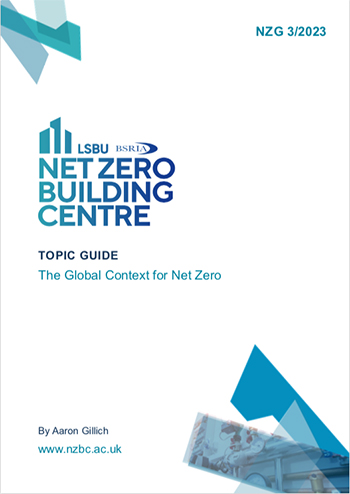The Global Context for Net Zero NZG 3/2023
[edit] Introduction to Net Zero Building Centre
This guide is published by the Net Zero Building Centre, a joint venture between BSRIA and London South Bank University. It considers how international agreements seeking to deliver net zero, how the UK is approaching net zero and the gaps between pledges and actions.
The term net zero has rapidly become part of common parlance and is in many ways synonymous with action on climate change. This guide clarifies the nature of the term and the international agreements seeking to deliver it. It breaks down where emissions occur in the global economy, where there are solutions, and where innovation is needed. It explores how the UK is approaching net zero and the gaps between pledges and actions, with a particular focus on the impacts for decision making in the built environment this decade. Finally, it considers the roles and responsibilities for government, the private sector and industry bodies, and what we can all do as individuals.
This guide is for built environment professionals, building occupiers, building owners and product manufacturers. It helps address the wider question ‘What does net zero mean for me?’ by placing the impacts of our personal and professional decisions in the built environment into the global context of climate change.
NZG 3 is the third in a series of guides published by the Net Zero Building Centre. The first, NZG 1/2022 Net Zero Carbon Buildings, provides an introduction to the topic of net zero and discusses some of the complex issues involved with moving towards a net zero built environment. The second, NZG 2/2023 Indoor Environmental Quality and Net Zero, considers how the various components of indoor environmental quality impact net zero individually, and how they interact in a holistic design approach.
The Net Zero Building Centre is a joint venture between BSRIA and LSBU with the aim of accelerating decarbonisation in the built environment. It is an innovation hub and centre of excellence that builds on the shared strengths of BSRIA and LSBU in the field of low carbon buildings.
[edit] Product details
Published: August 2023
Publisher: Net Zero Building Centre
Author: Aaron Gillich
ISBN: 978-0-86022-804-2
Free download here: https://www.bsria.com/uk/product/DXzajr/the_global_context_for_net_zero_nzg_3_2023_a15d25e1/
This article appears on the BSRIA bookshop websites as "The Global Context for Net Zero (NZG 3/2023)" dated August, 2023.
--BSRIA
[edit] Related articles on Designing Buildings
- Achieving net zero in social housing.
- Actuate UK issues climate warning and urges action.
- Aligning net zero with the levelling-up agenda.
- A zero-carbon UK by 2050?
- Carbon footprint.
- Carbon negative.
- Carbon neutral.
- Climate Change Act.
- Construction skills crisis threatens UK net zero goals.
- CO2nstruct Zero programme grows to over 70 businesses.
- Fabric first investigation into net zero for existing buildings.
- Half of public sector bodies not planning for net zero carbon.
- Heat pumps and heat waves: How overheating complicates ending gas in the UK.
- Infrastructure carbon reduction misses net-zero target.
- Low or zero carbon technologies.
- Making Mission Possible: report on achieving a zero-carbon economy by 2030.
- Nearly zero-energy building.
- Net Zero All Party Parliamentary Group NZ APPG.
- Net zero building centre with BSRIA and LSBU.
- Net zero by 2050.
- Net zero (whole life) carbon.
- Net zero carbon building.
- Net zero carbon emissions.
- Net Zero: Practical Pathway Programme.
- Net zero strategy: build back greener.
- Planning the infrastructure transition to net-zero.
- Refurbishment for net zero; a BSRIA white paper.
- Scotland publishes plans to reach net zero targets with Heat in Buildings Strategy.
- Skilled workforce unable to meet net zero ambitions.
- Smoothing the path to net zero.
- Thermal imaging of the building fabric in the net zero world.
- The LSBU and BSRIA Net zero building centre, topic guide Net Zero Carbon Buildings.
- Transform to Net Zero.
- Net zero carbon 2050.
Featured articles and news
Repairing historic stone and slate roofs
The need for a code of practice and technical advice note.
UKCW London to tackle sector’s most pressing issues
AI and skills development, ecology and the environment, policy and planning and more.
Managing building safety risks
Across an existing residential portfolio; a client's perspective.
ECA support for Gate Safe’s Safe School Gates Campaign.
Core construction skills explained
Preparing for a career in construction.
Retrofitting for resilience with the Leicester Resilience Hub
Community-serving facilities, enhanced as support and essential services for climate-related disruptions.
Some of the articles relating to water, here to browse. Any missing?
Recognisable Gothic characters, designed to dramatically spout water away from buildings.
A case study and a warning to would-be developers
Creating four dwellings... after half a century of doing this job, why, oh why, is it so difficult?
Reform of the fire engineering profession
Fire Engineers Advisory Panel: Authoritative Statement, reactions and next steps.
Restoration and renewal of the Palace of Westminster
A complex project of cultural significance from full decant to EMI, opportunities and a potential a way forward.
Apprenticeships and the responsibility we share
Perspectives from the CIOB President as National Apprentice Week comes to a close.
The first line of defence against rain, wind and snow.
Building Safety recap January, 2026
What we missed at the end of last year, and at the start of this.






















